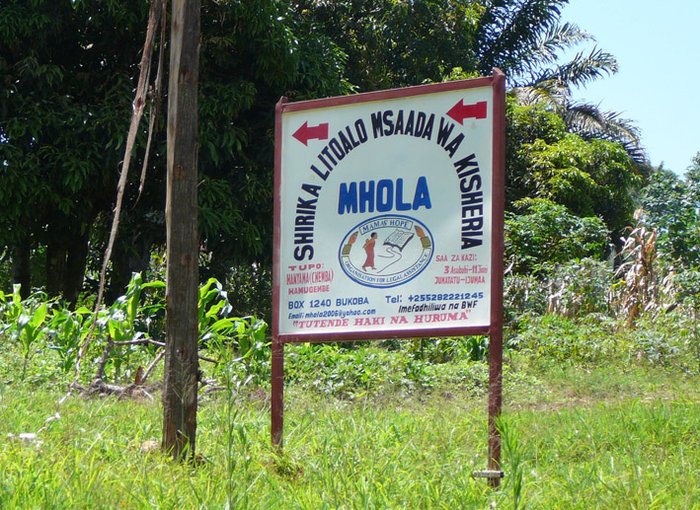
MHOLA Mama’s Hope Organization for Legal Assistance in Tanzania primarily offers Women and children legal advice. It is also responsible for training people in positions of responsibility and providing information on the subjects of health and hygiene, as well as the care of children with disabilities.
MHOLA its Head Office is based in the small town of Muleba, 70 kilometres from the provincial capital Bukoba on Lake Victoria. They also have branches in Karagwe district 180 kilometres from head office and Ngara branch 238 kilometres from head office. They offer various support services for the rural population on their large premises: a kindergarten with a special focus on caring for children with special needs, health care and education; Provision of Legal aid and psychosocial counselling in their open office hours. Mainly women take advantage of them and present their cases to advocates and legal officers. These then decide in which way MHOLA can help. Primarily the conflicts are about land ownership, Matrimonial and violence against women and children. Depending on a case to case basis, the help can range from a simple consultation to the writing of official letter and legal documents up to legal representation in court.
From the year 2017 to 2021 Clients received were = 5,154 (Male = 19,766, Female = 25,388) out of the said cases received 40,488 (90%) were resolved, Referred cases = 2,874, Pending = 1,409 and those ended without solution were 383.
The Judiciary system in Tanzania is advanced, however many people, especially those living in the rural areas, do not have access to legal representation and knowledge, and therefore are unable to defend themselves on legal grounds. Majority from rural areas do surrender their rights. To address such challenge MHOLA is offering these services free of charge.
Aside from legal conflicts, MHOLA tries to find a peaceful solution for both parties through mediation. However, even after the successful end of a conflict the work for MHOLA does not end. Only with further Mediation talks of the involved parties, and with the responsible people in the villages, can they guarantee that women who continue to live in this community do not get ostracized and are able to continue living in their community with their neighbours.
Women have had the right to own land, and to inherit it in Tanzania since 1999. Therefore, in case of a divorce, or the death of the husband they have the right to their own land. The government however has not fulfilled its obligation to inform different courts in the country, the administration and the people. On top of that many legal documents are only available in English, which can make it a communication problem in more rural areas.
Other important work areas for MHOLA are poverty reduction, health education, and the care of children with special needs and orphans. Their concept is that children are not put into an orphanage but instead stay in the village community, and either live with relatives or a trained custodian, who receive support. The children visit the local kindergarten or schools and receive clothes as well as meals. Those with authority in the village such as teachers, village chiefs, politicians and church members are won over for this project and function as multipliers. For this they are educated by MHOLA. They improve their abilities and are encouraged, to take their concerns and problems of their fellow villagers into their own hands and to get active in improving the lives of their contemporaries. There are some great challenges to this: finding new places for income due to the over fishing of the Victoria Lake, and the leaching of agricultural properties, improvement of health and nutrition situation as well as an ecological initiative for example planting trees.
The following example is from a wide spectrum of cases in which MHOLA is involved. Next to conflicts over land and inheritance, they are also about criminal behavior of individual and failure of the responsible government and police to act.
Mrs. J was a young Widow, when her husband a teacher died of what was probably alcohol abuse. They have four children, three of which still go to elementary school. The father in law, who had lost one of his other sons of an early death blames his daughter in law of murder and casts her out of the marital house and land. Mrs. J came with her children to the poor household of her uncle, where especially the kids were suffering malnourishment. When the father in law then took her to court for neglect of house and property in front of the village court, she came to MHOLA. A talk with the Judge produced, that he was planning to keep pushing the decision but would not be deciding in favor of Mrs. J. One harvest time after the other past. That is why the employees of MHOLA together with the Human rights work of the Lutheran church were looking for a way outside of the court. They organized a row of visitation for the way to reconciliation, and accomplished that Mrs. J was accepted back into her clan, returned to her house and begin working on her fields. They also helped her with the application for widow’s pension, and now three years after the death of her husband, the children from Mrs. J have returned to school and have full meals daily. The eldest has made it to secondary school.